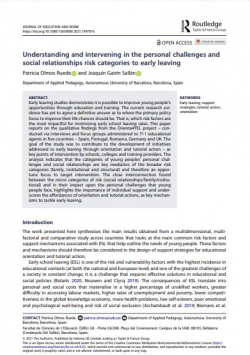
Understanding and intervening in the personal challenges and social relationships risk categories to early leaving
Year: 2021Authors: Patricia Olmos & Joaquín GairínDOI: 10.1080/13639080.2021.1997016Link: https://www.tandfonline.com/doi/full/10.1080/13639080.2021.1997016Keywords:
Early leaving studies demonstrate it is possible to improve young people’s opportunities through education and training. The current research evidence has yet to agree a definitive answer as to where the primary policy focus to improve their life chances should be. That is, which risk factors are the most impactful for minimising early school leaving rates. This paper reports on the qualitative findings from the Orienta4YEL project – conducted via interviews and focus groups administered to 711 educational agents in five countries – Spain, Portugal, Romania, Germany and UK. The goal of the study was to contribute to the development of initiatives addressed to early leaving through orientation and tutorial action – as key points of intervention by schools, colleges and training providers. The analysis indicates that the categories of young peoples’ personal challenges and social relationships are key mediators of the broader risk categories (family, institutional and structural) and therefore an opportune focus to target intervention. The close interconnection found between the micro categories of risk (social relationships/family/institutional) and in their impact upon the personal challenges that young people face, highlights the importance of individual support and underscores the affordances of orientation and tutorial actions, as key mechanisms to tackle early leaving.
![[DEV] Orienta4YEL](https://www.orienta4yel.eu/public/img/logo-horizontal.svg)






